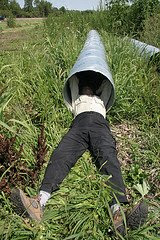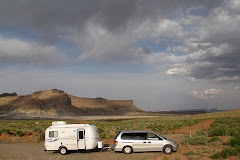Isabel and Max were at home in the evening, between trailer trips. Izzy was reading the paper. She remarked to Max:
“Have you heard about this new law? The Prevention of Cruelty to Hitchhiking Animals Act? PoCHAA?”
“PoCHAA? Is this some kind of joke?”
“No. Haven’t you heard that sometimes animals crawl up into the area around your car’s engine? They like it there ‘cause it’s warm and dark. They can hide. They seem to mistake it for a nice warm burrow. Remember, how you always find chewed pine cones on top of our engine when you change the oil?”
“Yeah, it’s those stupid chipmunks.”
“They’re not stupid—they’re cute. It’s probably Alvin, the one in our back yard.”
“They say in the paper that hitchhiking animals can be a real problem.
“What’s a hitchhiking animal?”
“That’s something like Alvin, or more often a raccoon, who’s snoozing on top the engine, under the hood. You get in, and drive away, and if he’s not quick, he goes along for the ride.”
“So, what’s the problem?” My dog used to love going for a ride. Head out the window, tongue dragging on the pavement…. Where’s the cruelty?”
“Says here that sometimes the animals aren’t so smart—or, they’re hibernating. You go for a long ride on a hot day, and the engine gets really hot, and the animal fries. A terrible death. Imagine that poor thing—trapped, trying to get out. If they climb out while you’re driving, they get run over. If they stay, they die from heat exhaustion. It says here a lot of the dead animals you see on the road actually come from inside cars.”
“Yeah, I remember reading about rats that live in cars. In places like New York, they climb up into parked cars and do a lot of damage. They chew through wires. Costs hundreds or thousands to replace the wires. If your electrical system suddenly goes haywire, it’s the rats.”
Izzy: “They could get electrocuted.”
“Serve them right.”
“Max, that’s unsympathetic! You love animals.”
“Yes, Animals in the rough. In their natural place. So, what’s the deal with PoCHAA?”
“Well, these Hitchhiking Animals can cause a lot of trouble. When they cook on a hot engine, it really stinks up the car.”
“Not to mention the stench when the body rots in your garage.”
Izzy: “That’s right, so pay attention. This is serious. They say that PoCHAA—it’s a voluntary program. If you live near a wooded area, and you don’t use your car every day, and you have certain makes of car, then you may be at risk for cooking some poor animal….” She studied the article.
“Max! We’re at risk! We live near the woods. You don’t drive everyday. You have a van with lots of space under the hood. And when you do drive, you go for hours. Let’s sign up for the PoCHAA program, so you don’t fry poor Alvin.”
“What’s involved?”
“A DNR wildlife expert comes out and inspects your car. If they find animal hairs or droppings on your engine, then they sign you up.”
“Sign us up for what? I don’t like the sound of this.”
Izzy: “They match you with a compatible animal. Research has shown… when you have a compatible animal around you house, your car becomes part of their territory. They defend it against other animals—and keep them out of your car.”
Max: “So what’s ‘compatible’ about having some wild animal around you house, courtesy of DNR?”
“They bring in some animal, usually a raccoon, one that knows the drill. An animal that knows enough to get out of your engine when you’re going for a drive. It’s almost like they are trained. DNR tests them, to see if they get out before you drive off. They actually have a test and training facility. It says here you’re supposed to bang on the hood twice before you get in the car. The animal climbs down and sneaks away on the opposite side. Most of the time, you’ll never even see it leave the car. They’re naturally cautious—that’s why most people don’t know about the problem of hitchhiking animals.”

Turkeys do not make good compatible animals, because they are more interested in copulating with cars than crawling under the hood.
Max: “What if I don’t want a raccoon around my house?”
“Most people, if they live near woods, or even just in the suburbs, have them around anyway. They live in the storm sewers, or hollow trees, and come out at night. They’re everywhere. This way, with PoCHAA, you get one that’s safe—“compatible,” as they say.”
Izzy kept badgering Max till he agreed to sign up for PoCHAA. A few weeks later, the DNR man came out—a young guy fresh out of college, with a degree in wildlife management. Yup, there were raccoon hairs on the engine, so he signed them up.
In fact, he had brought a “compatible” raccoon along—with a tiny green PoCHAA ear tag. When he released in the back yard, it quickly scurried away into the bushes and disappeared.
They never saw it again, until a few weeks later, when Max was out for a drive to his favorite state park for a walk and a swim. He smelt something funny, a sort of animal smell, and suddenly he remembered. He’d forgotten to bang on the hood! He’d jumped into and driven the car away, driven for nearly an hour, without any warning. When he stopped by the side of the highway and opened the hood, a somewhat disheveled raccoon with a green ear tag jumped out and limped away. It turned to “chitter” at him angrily before it disappeared into the tall grass.
The next day, with the aroma of singed hair still clinging to the van, Izzy grilled Max, and the story came out. Izzy understood Max--that he was sometimes impulsive and didn’t always follow the rules--but she was firm about getting another animal.
“Max, we’ll be out of compliance with PoCHAA if we don’t call DNR and get another compatible animal. If one dies on our engine, I won’t be responsible. You’ll have to pay for the cleanup! It’ll be on YOUR conscience--the agonizing death of an innocent animal!”
So the DNR guy came out again. This time he explained patiently that there was a shortage of compatible animals. Interest in PoCHAA was really taking off. Given Max’s record, they weren’t willing to risk another raccoon. There was already a long waiting list. But they did have plenty of skunks. Skunks weren’t very popular in the PoCHAA program, for obvious reasons. But the DNR man explained that skunks were really the perfect animal. They could hold their own against any wild raccoon that wanted to take over the car as a snoozing place. And, if you treated them with proper respect, they almost never created a stink.
“They’re one of the most misunderstood animals,” the man said. “They’re really very gentile and friendly.
“What about all those skunks you smell when you’re out driving in the country?”
“Research shows that two thirds of dead skunks on the highways actually came from inside cars. They’re asleep when you get in, and as you drive down the highway, they wake up and try to get out. They get run over, either by the car they jump out of, or by one behind. But if you have a compatible skunk, you’ll never have to worry. Our tested skunks are light sleepers, Mr. Berkeley. Next time if you forget to bang on the hood, he’ll wake up anyway and exit, before you drive off. Skunks are very intelligent.”
Max didn’t like the implied comparison. He thought the DNR guy was a bit too cocky, and he was embarrassed by what happened to the raccoon. According to the DNR guy, the hapless raccoon had turned up at an animal rehab shelter with burns and singed fur. They said it had PTSD--wouldn’t go near cars again—was lost to the PoCHAA program. He droned on.
“And we got a waiting list for raccoons a mile long,” the wildlife guy said, with a hint of reproach. “But this is a really good program. It’s part of the new philosophy of “behavioral pest control.” You work with the grain of animals, rather than against it. You can’t get rid of pests like raccoons, so you work with them. The animals get a safe home, and you get a clean car, with no odor problems.”
So Max, feeling a bit under duress, had accepted the skunk. The DNR guy said it was vaccinated against rabies, and they’d give him a special permit to keep a skunk. The DNR guy had a skunk caged right in his van. So they agreed, the DNR guy released the skunk, which then ambled off into the bushes, checking out his hew home with a fastidious and careful air.
A few days later, Izzy had a little pet door installed in the garage.
She said, “What’s the point of having a ‘compatible,’ if he can’t take a snooze whenever he wants? You do sometimes put you car in the garage.”
But it wasn’t long before Max noticed a little bowl of cat food in the garage. Whenever he opened the driver’s door, the skunk dropped out of the right front wheel-well within a few seconds, and ambled sleepily out through the little pet door. Max did notice a little “eau de skunk” whenever he started up the car, but it was usually gone within a minute or so.
In fact, he even began to like the faint musky odor. It reminded him of… something….

Max says: "I know there may be some skeptics out there, who don't believe in banging on their hood. If you're one of them, just google: 'rats damage car wiring' Signing up for a compatible animal will solve all your problems! Follow this link to sign up for PoCHAA. It’s completely voluntary."
Turtles do not make good compatible animals, because they are cold-blooded.

Travel tip by Max: "Don't forget to bang twice on the hood, folks. The animal you save could be your own."


No comments:
Post a Comment